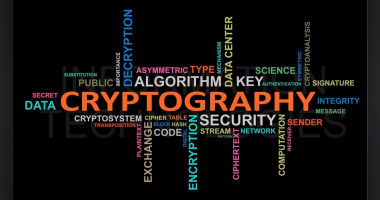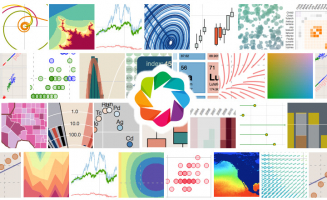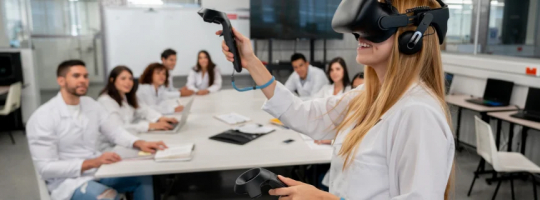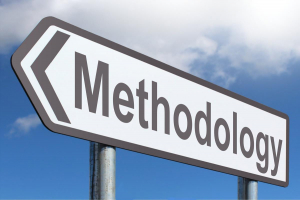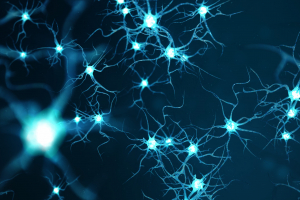Top 9 Best Online Genetics Courses
Genetics is the study of genes, genetic variation, and heredity. It involves biochemistry and molecular biology. The study of genetics has made you understand ... read more...why everybody has different physical characteristics and has elevated science to a level beyond our imagination. Here are some best online genetics courses listed by Toplist.
-
Why is DNA called the “blueprint of life”? What is a “DNA fingerprint”? How do scientists clone DNA? What can DNA teach you about your family history? Are genetically modified organisms (GMOs) safe? Is it possible to revive dinosaurs by cloning their DNA? DNA Decoded provides solutions to these and other questions. If you're interested in DNA, join Felicia Vulcu and Caitlin Mullarkey, two McMaster University biochemists, as they investigate the structure of DNA, how scientists unlocked the genetic code, and what your DNA may tell them about ourselves. You'll learn about the practical ways that scientists use to examine your genetic risks, change DNA, and find novel therapies for a variety of diseases along the way. Then, enter their virtual lab to conduct your own forensic DNA analysis of crime scene samples and solve a murder.
In this course, you'll learn about how James Watson and Francis Crick were able to solve the riddle of the molecular structure of DNA by building on the work of other scientists. Their groundbreaking discovery revealed that four nucleobases (adenine, thymine, cytosine, and guanine) combine with sugar and phosphate molecules to form the familiar double helix of DNA. You'll take a look at how the molecular structure of DNA regulates its functions; for example, how the chemical bonds (covalent and noncovalent) between these molecules allow DNA to "unzip" during replication.
Then they'll take a look at how you manage to fit over three billion base pairs into each of your cells. You'll explain how RNA copies the genetic information contained in your genes and uses this information to assemble amino acids into proteins. Scientists call this concept the "Central Dogma": DNA makes RNA, and RNA makes protein. You'll also explore how you transmit genetic information from one cell to another—and what happens when things go wrong.
Along the way, you'll learn about techniques (such as polymerase chain reactions and gel electrophoresis) that forensic scientists use in DNA fingerprinting. You'll explore the techniques scientists use to manipulate DNA. Genetic engineering has allowed you to increase crop yields, diagnose illnesses, develop vaccines, and manufacture insulin. By carefully selecting a pair of molecular scissors (restriction enzymes), scientists are able to isolate a gene of interest and insert it into plasmid DNA, turning a common bacteria (E. coli) into a molecular copying machine. In week 4, you'll learn that mutations are genetic errors but that not all mutations are necessarily bad—in fact, some mutations confer a selective advantage that protects against disease. You'll explain what genetically modified organisms are (and what they are not) and weigh in on the heated debates about the ethics and safety of GMOs in the popular media.
What does your DNA say about you? You may have heard that you share 99% of your genetic material with everyone else on the planet. That's true, but this week you're going to take a look at the less than 1% that makes you unique. You'll kick off by discussing the Human Genome Project, the massive scientific collaboration that mapped out the sequence of all your genetic material. The technologies developed while mapping out the human genome ushered in a new age in DNA research. Now, genome-wide association studies can analyze massive amounts of data, searching for genetic variations that are associated with particular diseases. Pharmacogenomics may help determine which drugs are likely to be most effective for you. Genetic genealogy tests (such as Ancestry DNA, 23 and Me, and Family Tree DNA) will allow you to trace random mutations in your DNA that can provide clues to your ethnic heritage. As an added bonus, you'll discuss whether it would be possible to revive extinct species by studying ancient DNA.
This course offers
- Flexible deadlines
- Shareable Certificate
- 100% online
- Intermediate Level
- It takes approximately 23 hours to complete.
- Subtitles: Arabic, French, Portuguese (European), Italian, Vietnamese, German, Russian, English, Spanish
Coursera rating: 4.8/5
Enroll here: https://www.coursera.org/learn/dna-decoded
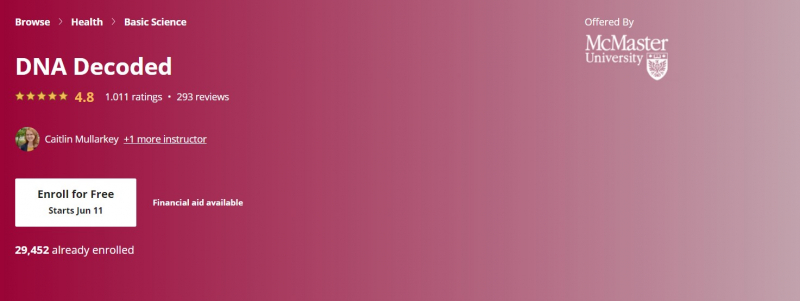
https://www.coursera.org/ 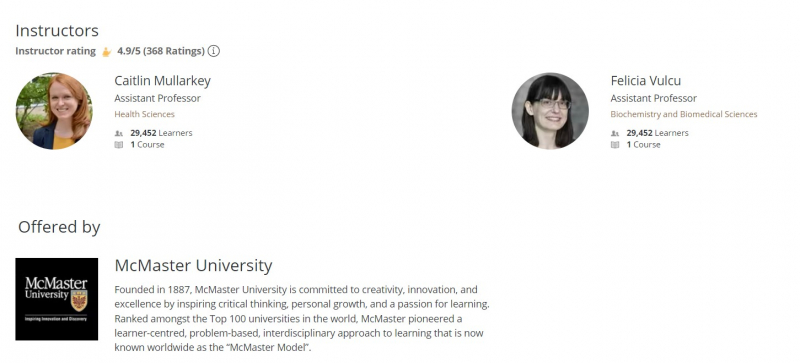
https://www.coursera.org/ -
Genomes for Law presents a one-of-a-kind framework for reviewing the history and fundamentals of genomics research as well as investigating how genomics has and will continue to interact with the law. Throughout this course, you will investigate the legal implications of genomics research as well as the legal influences and consequences of genomics research as they relate to the following topics:
- Genomics and Criminal Law
- Genomics and Criminal Procedure
- Forensic Genomics
- Intellectual Property Protection and Biotechnology
- Genomics and Tort Law.
- Genomics and Privacy Law:
- Legal and Ethical Issues in Genomics
This course can be taken to fulfill continuing legal education (CLE) credits for practicing lawyers. 9 MCLE hours have been approved in Illinois. In this course, you will review what genomics is and discuss the relationship of genomics to the law. You will review the basic structure and function of the genome, the vocabulary used to describe its components, and understand how technology has and will continue to influence genomics, as well as how genomics is used in a variety of fields, including healthcare, food security, energy, and law. You will discuss the relationship of genomics to criminal law; how genetic evidence and genomic defenses currently operate in the criminal justice system; and explore how fully allowing genetic evidence and genomic defenses might improve or harm criminal law.
You will understand how criminal law might or might not recognize genomics as a defense, review types of changes needed in criminal law to accommodate genetic evidence, and examine how changes in criminal law, to accommodate genetic evidence and defenses, could impact criminal law. You will explore how private individuals' genomes are in a criminal law context, how DNA is examined and processed in criminal investigations, and examine under what circumstances individuals' genomes are protected from access by the government in a criminal law context. You will also recognize under which circumstances the government has an interest in individuals' genomes in a criminal law context and review the basics of the CODIS STRs (Combined DNA Indexing System). You will also review the history, economics, and legal reasoning behind intellectual property protection. You will then examine the basic requirements to obtain a patent and identify which types of biological materials or processes are patent eligible using current case law. Additionally, comparative intellectual property legal regimes will be introduced. This is one of the best online genetics courses.
This course offers
- Flexible deadlines
- Shareable Certificate
- 100% online
- Beginner Level
- It takes approximately 12 hours to complete.
- Subtitles: French, Portuguese (European), Russian, English, Spanish
Coursera rating: 4.8/5
Enroll here: https://www.coursera.org/learn/genomics-for-law
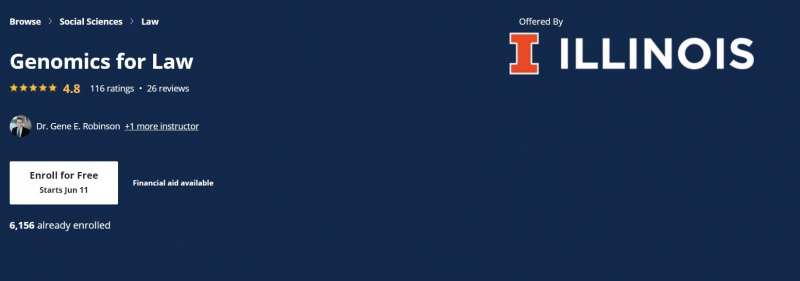
https://www.coursera.org/ 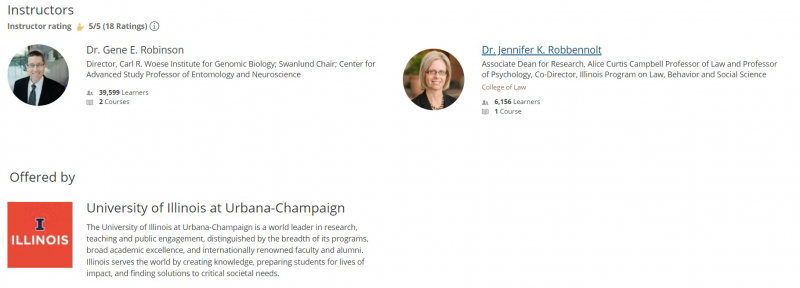
https://www.coursera.org/ -
Introduction to Genetics and Evolution is a college-level course provided to incoming students at Duke University at the same time. The course provides interested individuals with a very basic understanding of some of the ideas underlying these key areas of biology. They frequently hear about new "genome sequences," commercial kits that can tell you about your ancestry (including pre-human) from your DNA or disease predispositions, and debates about evolution's truth, why animals behave the way they do, and how people discover "genetic evidence for natural selection." This course teaches the fundamental biology needed to better comprehend all of these concerns, attempts to clear up certain myths, and attempts to prepare students for future, more advanced biology training (and especially evolutionary genetics). There is no prerequisite coursework.
In this course, you will discuss the definition of the word "evolution" in a biological context, evidence for the truth of evolution and common ancestry of species, and public thoughts and misconceptions about biological evolution. This module is optional and will not be included in the course assessments. There are no class discussion forums for this section, as they feel such discussion can happen on other, non-course-related, sites on this topic (of which there are a great many on the internet). delves somewhat more deeply into genetics and specifically the concept of "recombination." It begins to discuss how recombination is leveraged in classic genetic works as well as mapping simple genetic traits using crosses or data from natural populations. delves even more deeply into the complexities of the genetics underlying traits, the origin of genetic variation, and how "complex" traits (ones controlled by multiple genes) are studied genetically.
It introduces how population growth is studied by looking at the relative contributions of genetics and environment to traits, and it also introduces how population genetics is studied. It discusses how multiple individuals from natural populations can be studied genetically to begin to understand the evolutionary forces acting upon the populations. This one extends the previous one to specifically examine the effects of natural selection and genetic drift on genetic variation in natural populations. The final module talks about the applications and misapplications of many of the concepts discussed in the course to human health, understanding, and well-being. This module is optional and is not included in the assessments.
Dr. Mohamed Noor is the Earl D. McLean Professor and Chair of Biology at Duke University. His expertise is in molecular evolution, and a large part of his research has been devoted to trying to understand the genetic changes that ultimately lead to the formation of new species. More recently, his research team has used fruit fly species to understand the causes and evolutionary consequences of variation in rates of genetic recombination and exchange. Dr. Noor has received several awards for research, teaching, and mentoring and has been active in the scientific community, including serving as president of the American Genetic Association and the Society for the Study of Evolution, chair of the NIH study section in Genetic Variation and Evolution, and editor of the journal Evolution.
This course offers
- Flexible deadlines
- Shareable Certificate
- 100% online
- It takes approximately 25 hours to complete.
- Subtitles: Arabic, French, Portuguese (European), Italian, Vietnamese, German, Russian, English, Spanish, Romanian
Coursera rating: 4.8/5
Enroll here: https://www.coursera.org/learn/genetics-evolution
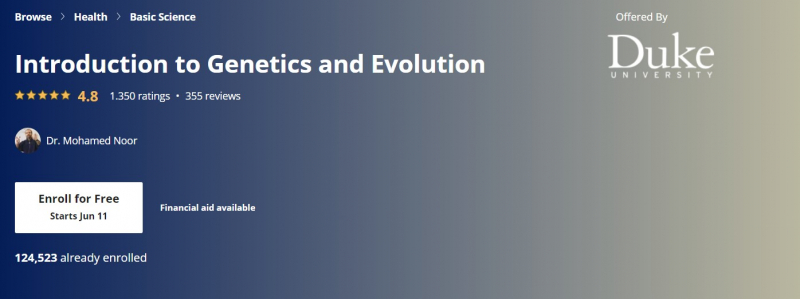
https://www.coursera.org/ 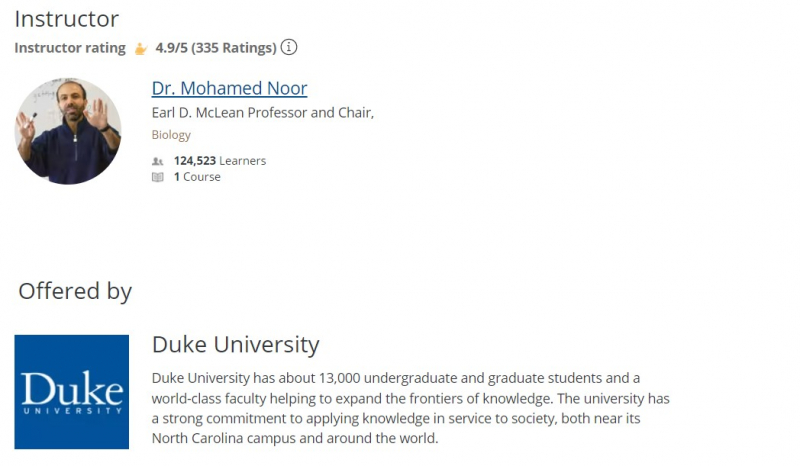
https://www.coursera.org/ -
What exactly is a genome? A genome includes all of the information required for a cell to develop, operate, and replicate itself, as well as all of the information required for those cells to join together to become a human, plant, or animal. Genomes include an organism's whole collection of genes as well as the even more minute genetic structures that help govern when and how those genes are employed. Genomes encode the ability to repair a damaged ligament, signs that may anticipate the development of mental disease, the nutritional potential of crops, and even the history of life itself. By completing this course, you will learn how scientists are interpreting the language of genes to generate sustainable food and fuel supplies, better illness treatment and prevention, and safeguard your environment. This course's primary lecturer is Professor Robinson. In addition, each module includes a number of guest professors. These guest teachers come from a variety of disciplines—biology, physics, computer science, and many others—and pursue a variety of research aims, but they all have a common interest in genomic techniques and technology.
Genes, genomes, DNA: these words have slipped into the daily news cycles and the awareness, but what they actually mean often remains unclear. In these lessons, they aim to give you not just the Biology 101 explanation of what a genome is but a real-life perspective on why you already care about genomics—perhaps in ways you didn’t even realize. Are you interested in where your food comes from, what health conditions you are most likely to develop, or what fish will share your aquarium most successfully? Genomes are a key to finding a better answer to these and other everyday questions.
You may have seen DNA visually represented in different ways: a twisted ladder, a tangle of string, an array of sloppy X shapes, a row of letters. But what is DNA actually doing, and how does it relate to genes and the genome? How are scientists able to move from studying the physical structure of the genome to understanding its functionality? This module will help you become more comfortable with these ideas.
Often, they hear about genes only when something goes wrong – when mutations, mistakes made in the DNA sequence, cause a disease like cancer or cystic fibrosis. But what happens inside their cells that leads from a mutation in DNA to the physical symptoms of a disease? Why do some mutations cause positive outcomes or no change at all? To answer these questions, you take a closer look at how information flows from genes, to RNA, to proteins, and to all the physical structures and processes that make up living things.
If all the cells in all the tissues and organs of your bodies have the same genome, how is it that they can look so different? How does a hair cell, a white blood cell, or a brain cell know what to do or where to go? The answer can be found by looking beyond the structure of the genome, into the timing of its activities. Recognizing how the information stored in the genome can be used in flexible ways shows them how living things can develop and change over time. You may have heard of "nature vs. nurture" or the modern day response, "nature AND nurture!" But how does "nurture," the environment, act on the genome? Can the biological effects of experience be passed from one generation to the next? And what does all of this have to do with everyday issues like your physical and mental health? A closer look at two mechanisms that help regulate the activity of genes, epigenetic modifications and transcription factors, provides some answers.
The world is a big and sometimes incomprehensibly complex place. Just as no gene in the genome acts in isolation, no living thing on this planet exists in isolation. In this final module of the course, you explore some of the rich, complicated interactions between living things, their genomes, and the world that surrounds them.
This course offers
- Flexible deadlines
- Shareable Certificate
- 100% online
- Beginner Level
- It takes approximately 36 hours to complete.
- Subtitles: Arabic, French, Portuguese (European), Serbian, Italian, Vietnamese, German, Russian, English, Spanish, Romanian
Coursera rating: 4.6/5
Enroll here: https://www.coursera.org/learn/genomics-research#syllabus
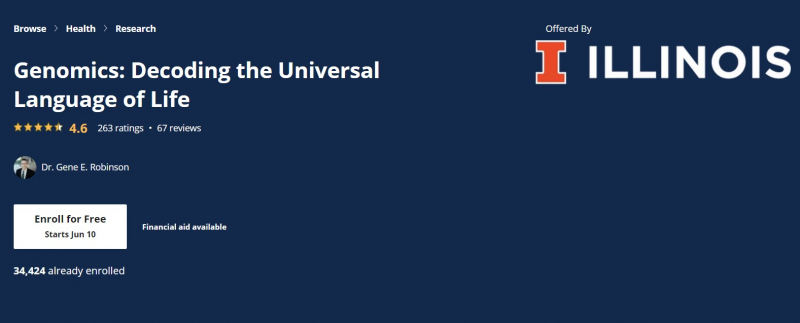
https://www.coursera.org/ 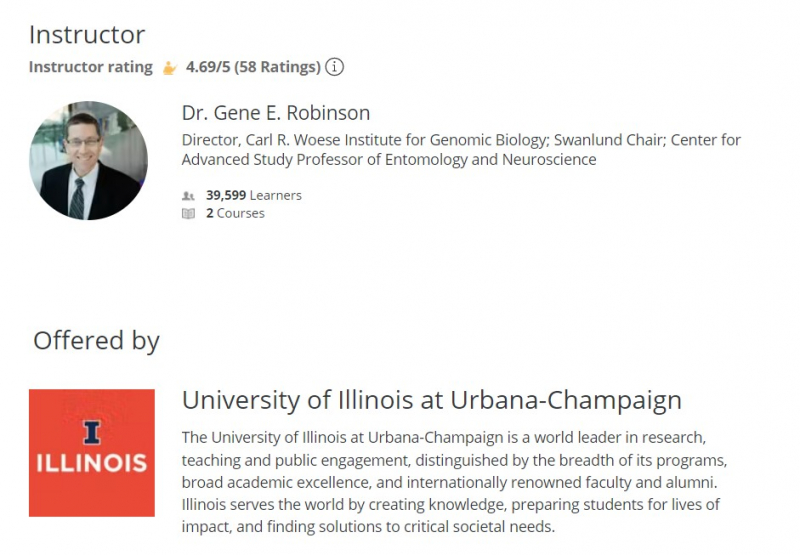
https://www.coursera.org/ -
How have genetic advances impacted society? What information do you need to make ethical judgments concerning genetic technologies? This course covers cloning, genetic enhancement, and genetic information ownership. Participants will gain the skills needed to investigate the ethics of contemporary genetics and learn how to incorporate these topics into their classes.
In this course, you will explore the history of genetics and genomics and be introduced to ways of thinking ethically about issues involving genetic technology. You will learn how ethical issues can be used to spark your students’ interest and how to uncover students’ misconceptions. You will explore systems biology, stem cells, and cloning and the applications of these technologies. You will also learn about the ethics of cloning, which will be the basis for your written assignment, which opens this week. You will see how genetic information is being used to individualize medical treatments and take a video tour of the Sackler Institute for Comparative Genomics at the American Museum of Natural History. You will also apply the science and engineering practices from A Framework for K-12 Science Education and the Next Generation Science Education Standards in considering how to engage students in discussion about ethics. You will learn about the societal implications of genetically modified food and discuss ways to incorporate this issue into your teaching.
Dr. DeSalle works in molecular systematics, microbial evolution, and genomics. His current research concerns the development of bioinformatic tools to handle large-scale genomics problems using phylogenetic systematic approaches. Dr. DeSalle has worked closely with colleagues from Cold Spring Harbor Labs, New York University, and the New York Botanical Garden on seed plant genomics and the development of tools to establish gene family membership on a genome-wide scale. His group also focuses on microbial genomics, taxonomy, and systematics. In particular, they approach tree-of-life questions concerning microbial life using whole genome information. He also dabbles in Drosophila systematics. Dr. David Randle joined the American Museum of Natural History’s Education Department after a 15-year career as a science teacher in the New York City public schools. He is currently the Assistant Director of Curriculum and Instruction and works on programs for teachers through Seminars on Science, the Museum’s online graduate level professional development program, and in face-to-face programs through the Museum’s Gottesman Center for Science Teaching and Learning.
Dave began his education career in 1988 as an intern in the Museum’s Education Department. From there, he began teaching science at Middle School 44, located across the street from the Museum, where he helped develop a partnership with AMNH. The goal of the school’s curriculum was to turn the museum's halls into classrooms and to infuse museum-related topics into all subject areas. Each week, students spent a three-period block of time in the exhibit halls. Dave spent many hours in the museum, teaching students and designing a rich variety of activities in many of the halls. After leaving MS 44, he spent four years as a teacher at the Beacon School, an alternative public high school near Lincoln Center in Manhattan. There, he taught physics, biology, museum science, and blues band before coming to work at the museum.
Dave has been a member of the Seminars on Science team since 2000 and has worked full-time at AMNH since 2004. He recently completed a Ph.D. in Science Education at Columbia University. His research interests relate to how teachers learn science online.This course offers
- Flexible deadlines
- Shareable Certificate
- 100% online
- It takes approximately 8 hours to complete.
- Subtitles: Arabic, French, Portuguese (European), Italian, Vietnamese, German, Russian, English, Spanish
Coursera rating: 4.6/5
Enroll here: https://www.coursera.org/learn/genetics-society#about
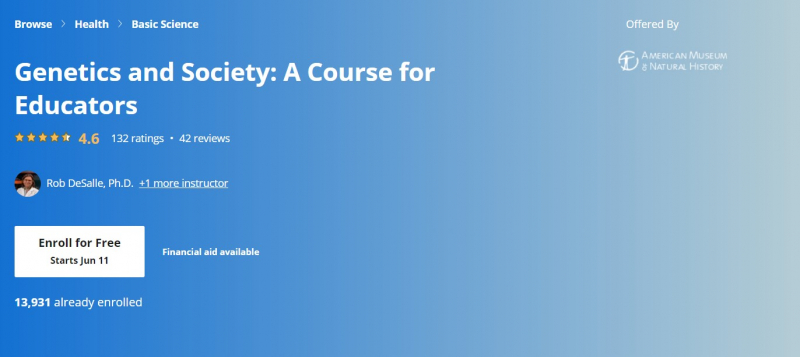
https://www.coursera.org/ 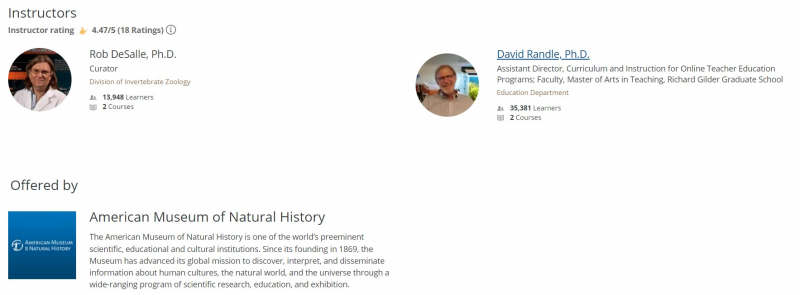
https://www.coursera.org/ -
This course will expose you to the fundamental biology of contemporary genomics as well as the experimental methods used to quantify it. The Central Dogma of Molecular Biology will be introduced, as well as how next-generation sequencing may be used to analyze DNA, RNA, and epigenetic patterns. You'll also learn about essential ideas in computing and data science that will help you comprehend how data from next-generation sequencing tests is created and processed.
In this course, you can expect to study topics like "Just enough molecular biology," "The genome," "Writing a DNA sequence," "Central dogma," "Transcription," "Translation," and "DNA structure and modifications," learn about polymerase chain reaction, next generation sequencing, and applications of sequencing, and cover a few basic topics in computing technology. They'll go over the foundations of computer science, algorithms, memory and data structures, efficiency, software engineering, and computational biology software. They'll be covering quite a lot of information about how to handle the data produced during the sequencing process. They'll cover reproducibility, analysis, statistics, question types, the central dogma of inference, analysis code, testing, prediction, variation, experimental design, confounding, power, sample size, correlation, causation, and degrees of freedom.Jeff Leek is an Assistant Professor of Biostatistics at the Johns Hopkins Bloomberg School of Public Health and co-editor of the Simply Statistics Blog. He received his Ph.D. in Biostatistics from the University of Washington and is recognized for his contributions to genomic data analysis and statistical methods for personalized medicine. His data analyses have helped them understand the molecular mechanisms behind brain development, stem cell self-renewal, and the immune response to major blunt force trauma. His work has appeared in the top scientific and medical journals Nature, Proceedings of the National Academy of Sciences, Genome Biology, and PLoS Medicine. He created Data Analysis as a component of the year-long statistical methods core sequence for Biostatistics students at Johns Hopkins. The course has won a teaching excellence award, voted on by the students at Johns Hopkins, every year Dr. Leek has taught the course.
This course offers
- Flexible deadlines
- Shareable Certificate
- 100% online
- It takes approximately 6 hours to complete.
- Subtitles: Arabic, French, Portuguese (European), Serbian, Italian, Vietnamese, German, Russian, English, Spanish
Coursera rating: 4.6/5
Enroll here: https://www.coursera.org/learn/introduction-genomics#syllabus
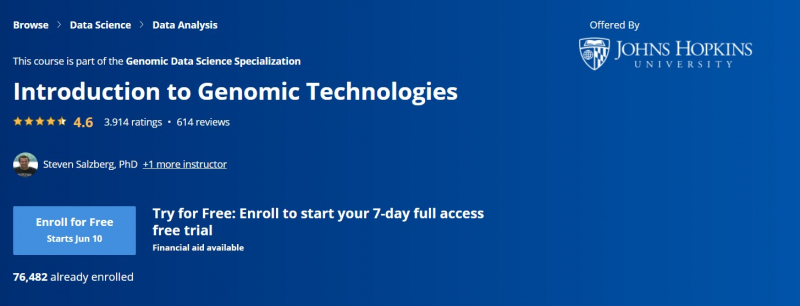
https://www.coursera.org/ 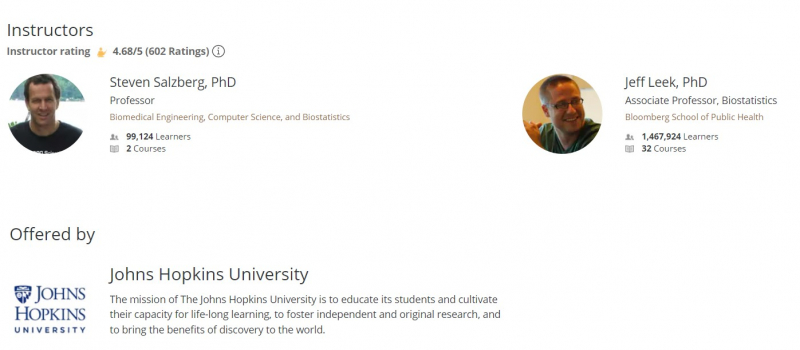
https://www.coursera.org/ -
Because genomics is causing a revolution in medical discoveries, it is critical to be able to better comprehend the genome and exploit data and information from genomic databases. Genomic Data Science is the study of the genome using statistics and data science.
This specialization introduces the ideas and methods needed to comprehend, evaluate, and interpret results from next-generation sequencing research. It covers the most frequently used tools in genomic data science, such as how to utilize the command line, as well as software implementation tools such as Python, R, and Bioconductor. This specialization is intended to serve as a standalone introduction to genomic data science as well as a perfect complement to a primary degree or postdoc in biology, molecular biology, or genetics for scientists in these fields seeking to gain familiarity with data science and statistical tools in order to better interact with data in their daily work.
This course will expose you to the fundamental biology of contemporary genomics as well as the experimental methods used to quantify it. The Central Dogma of Molecular Biology will be introduced, as well as how next-generation sequencing may be used to analyze DNA, RNA, and epigenetic patterns. You'll also learn about essential ideas in computing and data science that will help you comprehend how data from next-generation sequencing tests is created and processed. This class provides an introduction to the Python programming language and the iPython notebook. This is the third Genomic Big Data Science Specialization course at Johns Hopkins University. You will learn computational methods—algorithms and data structures—for analyzing DNA sequencing data.
You will learn a little about DNA, genomics, and how DNA sequencing is used. You will use Python to implement key algorithms and data structures and to analyze real genomes and DNA sequencing datasets. It introduces you to the commands that you need to manage and analyze directories, files, and large sets of genomic data. This is the fourth Genomic Big Data Science Specialization course at Johns Hopkins University. Learn to use tools from the Bioconductor project to perform analysis of genomic data. This is the fifth Genomic Big Data Specialization course from Johns Hopkins University. An introduction to the statistics behind the most popular genomic data science projects. This is the sixth course in the Genomic Big Data Science Specialization from Johns Hopkins University. This is one of the best online genetics courses.
This course offers
- Shareable Certificate
- 100% online courses
- Flexible Schedule
- Intermediate Level
- Approximately 6 months to complete
- Subtitles: English, Arabic, French, Portuguese (European), Serbian, Italian, Vietnamese, German, Russian, Spanish
Coursera rating: 4.3/5
Enroll here: https://www.coursera.org/specializations/genomic-data-science#courses
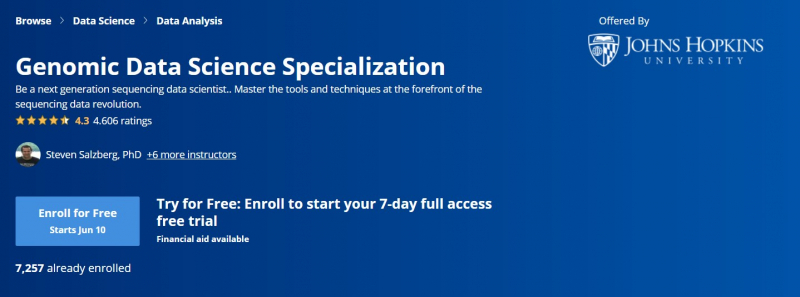
https://www.coursera.org/ 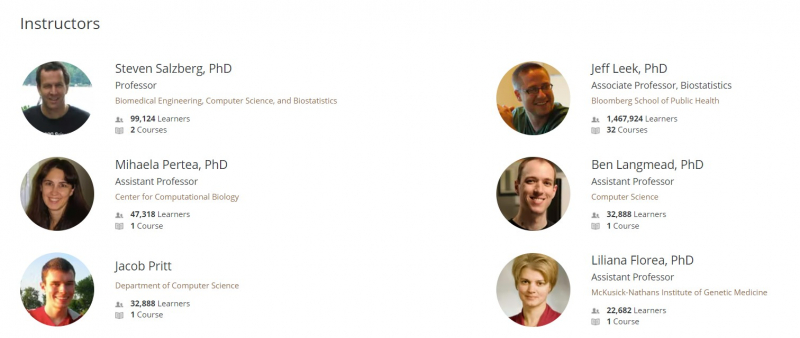
https://www.coursera.org/ -
This course distills professional knowledge and abilities in health data science and bioinformatics for you. You will discover intriguing facts about the human body's biology, chemistry, genetics, and medicine, which will be integrated with Big Data science and skills to harness the avalanche of data that is readily available at your fingertips and that they are only beginning to make sense of. They'll look at the many processes necessary to master Big Data analytics on actual datasets, including Next Generation Sequencing data, in healthcare and biological setting, from data preparation through analysis completion, understanding the results, visualizing them, and communicating the results.
Needless to say, after you've mastered these in-demand abilities, you'll be well-positioned to apply for or advance in careers in biomedical data analytics and bioinformatics. You will obtain extremely useful new or refined abilities that will help you stand out as a professional and wish to delve even further into biomedical big data, regardless of your skill levels in biomedical or technical fields. The instructor hopes that this course piques your curiosity about the tremendous potential provided by publicly available big data to better understand, prevent, and cure illnesses.
Dr. Isabelle Bichindaritz is an associate professor of Computer Science and Director of Biomedical Informatics at SUNY Oswego. Following receiving a Ph.D. in Computer Science from the University René Descartes – Paris V, Dr. Bichindaritz served as a research scientist at the Fred Hutchinson Cancer Research Center in Seattle and as an assistant professor and professor at the University of Washington, Tacoma Institute of Technology, and the National School of Public Health. Her research focuses on intelligent learning systems and biomedical data science for decision analytics and data analytics in healthcare and biomedical research, as well as more broadly on artificial intelligence in medicine. She has authored or co-authored more than 100 papers in peer-reviewed journals and conferences. This is one of the best online genetics courses.
The course offers
- Flexible deadlines
- Shareable Certificate
- 100% online
- Advanced Level
- It takes approximately 40 hours to complete.
- Subtitles: French, Portuguese (European), Russian, English, Spanish
Coursera rating: 4.2/5
Enroll here: https://www.coursera.org/learn/data-genes-medicine
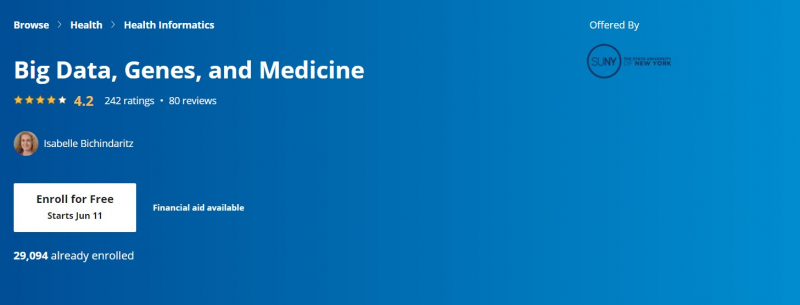
https://www.coursera.org/ 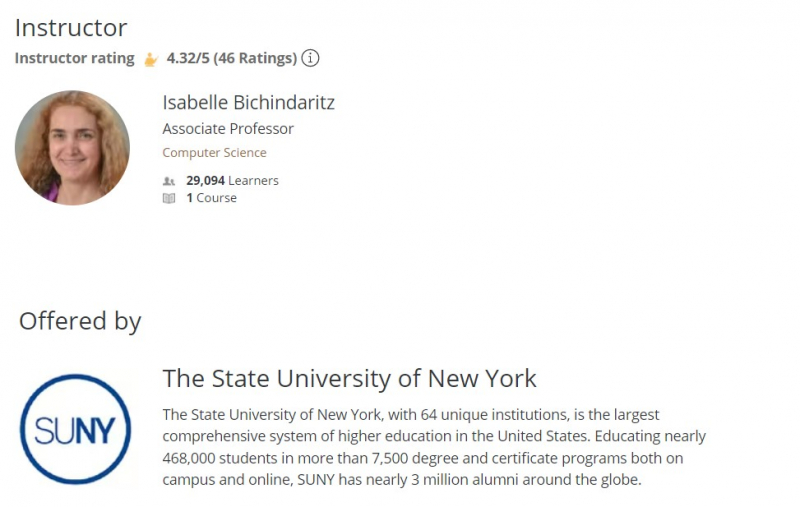
https://www.coursera.org/ -
The University of Colorado Denver is presenting this course in partnership with the Vanderbilt Genetics Institute at Vanderbilt University Medical Center and the International Genetic Epidemiology Society. It is intended to give students the background and knowledge foundations required to undertake statistical analysis of genetic association research data. Dr. Nancy Cox will present the history of genetics research; Dr. Bruce Weir will present foundational concepts in population genetics; Dr. Todd Edwards will present population structure in genetic association studies; Dr. Goncalo Abecasis will present quality control in genetic studies; Dr. Celia Greenwood will present an analysis of population-based case-control association studies, and Dr. Celia Greenwood will present an analysis of population-based case-control association studies. This 6-module course also includes concept examples and reference books.
Todd Edwards is a genetic epidemiologist conducting research on the genetic determinants of complex human traits. He works extensively with electronic health record data to develop cohorts for genetic association studies. He also works on cardiovascular traits such as blood pressure and hypertension, colorectal cancer, and women's health traits, and in general, he is interested in studying traits with large racial disparities in incidence, average value, or severity. Stephanie A. Santorico is a Professor and Associate Dean at the University of Colorado-Denver. She has a track record of impactful research in statistical genetics and genomics as well as in the development of educational programs in statistics and genetics. She is interested in understanding the genetic factors that contribute to complex traits, including translational research working towards disease subtypes that could inform medical treatment. This is one of the best online genetics courses.
This course offers
- Flexible deadlines
- Shareable Certificate
- 100% online
- Intermediate Level
- It takes approximately 17 hours to complete.
- Subtitles: English
Coursera rating: 4.2/5
Enroll here: https://www.coursera.org/learn/genetic-epidemiology#about

https://www.coursera.org/ 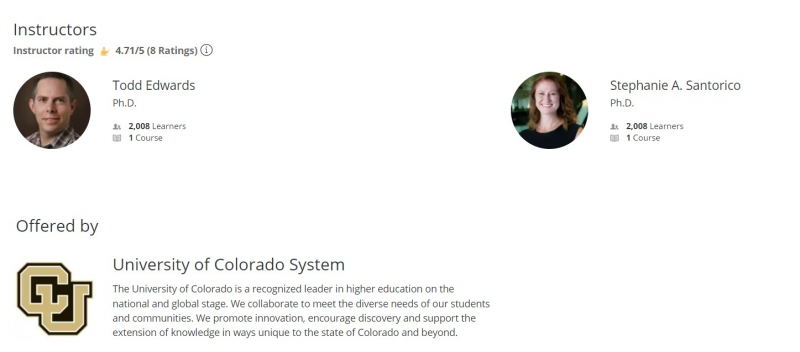
https://www.coursera.org/














